Why Legend of the Galactic Heroes is Worth Your Time
by Anne Lauenroth,For 20 years since its completion, Legend of the Galactic Heroes has been one of anime's classic holy grails, yet there never was a way to experience the monumental space war between the Galactic Empire and Free Planets Alliance beyond fansubs, adding to the series' allure as an inaccessible insider treasure. Now for the first time, the show is available for legal streaming on HIDIVE (just ahead of the announced Sentai release). After years of flourishing in obscurity, is it finally time to check out that old show some of your otaku friends won't shut up about?
At HIDIVE's planned release schedule of 3-4 episodes every Thursday, the last episode won't become available until February 2018, but looking back at the series' original release history, what seems like the distant future might feel more like tomorrow. As one of the most ambitious anime projects ever conceived, LOGH's 110 episodes came out over the course of over 9 years, from 1988 to 1997, solely in OVA home video format. If you were to count the movies and Gaiden prequel series, it all adds up to 162 episodes, 3 films and 11 years of production history. Barring the 1992 Golden Wings installment, it's a remarkably consistent affair, helmed by space opera veteran Noburo Ishiguro. Judging by what has already been translated into English, he's been very faithful to the source material in tone and story.
Impressive longevity and reputation aside, why should you commit to a 110-episode political drama from the 1980s when a shiny new adaptation of Yoshiki Tanaka's award-winning novels is already in production? On that note, let me address some of the reservations that might keep you from checking out a show that truly hasn't lost its punch.


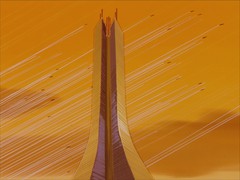
It's old.
Yes it is, but if you believe that truly good stuff doesn't age out of relevance in any medium, let's move on to some more concrete concerns right away.
The art style and animation are so dated.
Despite revolving around outer space warfare, it's fair to say that battles in LOGH are almost exclusively 2D in nature. So the show's battle strategies resemble 20th-century naval warfare rather than fully employing the 3D gravity-free vastness of space, but Tanaka and Ishiguro are hardly the only sci-fi creators ignoring physics for the convenience of easing the audience's ability to follow the action. On the plus side, this also means that every aspect of these battles is meticulously hand-drawn, wonderfully detailed spaceships and explosions included. There are no poorly-integrated CGI ship models that anime fans would often lament clashing with hand-drawn backgrounds and characters. Everything comes together in one seamless, beautiful, hand-drawn package.
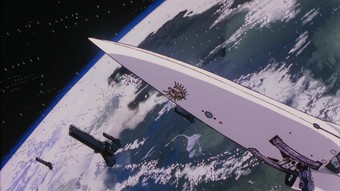

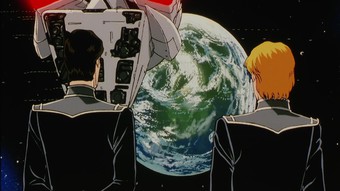
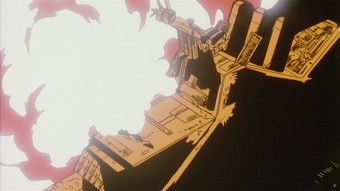
The characters, while fairly timeless in their classical designs, can suffer from wooden facial animation, but the series' impressive cast contains all who's who of voice actors at the time, more than making up for any potential loss in visual expressiveness. Through stellar performances, they bring brilliant characters to life like the autocratic revolutionary Reinhard, whose ideals stem from anger and hate, or the approachable Yang, a hero against his will who comforts his disillusioned democratic soul with too much brandy.

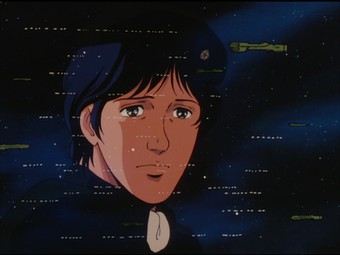
It's long.
Even if you don't have to watch the films and prequel series to get a feeling of closure for this story, you're still looking at a whopping ~2800 minutes of your life spent on a single show. It's a daunting prospect, but the return on investment is heightened by one of the most satisfying anime endings ever written, which was planned and prepared since the very beginning, since the last novel was published two years prior to the release of the first anime episode. LOGH's finale is so reflective of the show's central themes that payoff is guaranteed without the need for any eyebrow-raising last-minute twists these genius vs. genius stories like to indulge. Not many shows manage to stick a landing this perfectly in just one or two seasons, but LOGH does so after almost 10 years of buildup.

There's no dub.
This is a valid concern for a series that asks for viewers' undivided attention. In a cast so large that staying on top of everyone's rank and affiliation alone is a challenging task, Ishiguro expects his audience to keep up with every conversation, some of which might seem like minor chit-chat at first, before elements from them come back many episodes later to appear in a very different light, but little help is provided via flashback reminders. While these conversations tend to get long, the fact that every interaction carries weight and meaning helps bolster some of the show's less cinematic aspects. LOGH has many merits, but it's not a show that lends itself to pass the time doing laundry or homework.
It's slow and boring.
It's true that characters can spend several episodes on preparing their next engagement, but Legend of the Galactic Heroes isn't so much about the epic battles themselves as it is about their political implementation, aftermath, and ultimate impact in the course of history. Not only does this serve to make all the talk between the action more fascinating, it also offers a more realistic approach to war, where the outcome is often determined by numbers and politics instead of individual heroism. Game-changing decisions are rarely made by foot soldiers or fighter pilots on the front lines, and no matter the brilliance of Yang and Reinhard, Tanaka doesn't shy away from exposing the less heroic consequences of his heroes' exploits.


I don't like space operas.
Set in the 36th century CE, Legend of the Galactic Heroes is more of a historical war drama in a space opera setting. Constant references to wars past and yet to come firmly root the show in future history territory, complete with a narrator guiding us through events documentary style (often with the benefit of hindsight). Characters are concerned with humanity's history and their place in it to an unusual degree, reflecting Tanaka's own passions as a history buff, well aware of ideas like historic recurrence or the Great Men theory, which he manages to acknowledge and challenge simultaneously.


While an interest in history and politics might benefit access and enjoyment, LOGH has another key selling point that sets it apart from many other shows, including the upcoming remake.
The Music
Apart from openings, endings, and a few in-show exceptions for things like national anthems, Legend of the Galactic Heroes has no original soundtrack. Instead, it opts for a score entirely composed of classical music. Its featured pieces were clearly chosen by people both knowledgeable and enthusiastic about the subject matter, as the selection goes far beyond the usual suspects of Ode to Joy for psychotic villains or Ride of the Valkyries for epic battles and their subversions. In LOGH, spaceships dance to their deaths to Ravel's Bolero, fateful encounters call for Mahler symphonies, and characters embrace sacrifice over compromising their ideals to Bruckner or perish quietly to the melodies of Siegfried Idyll and the Pathétique. It's a bold choice, rewarded with comprehensive dramatic victory. Not only do viewers get to enjoy a remarkable selection of musical masterpieces from multiple eras, the soundtrack also adds a timeless quality to the show, once again reinforcing the story's themes.

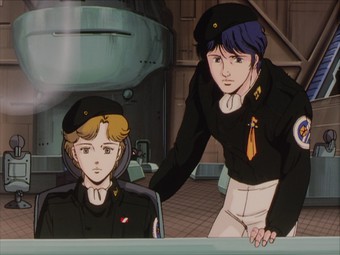
But where to start?
That's easy! Episode 1 is now available for legal streaming in the US. No prior knowledge or research are required, no reading up on who's at war with who since when and for what reason; the series will tell you, not always right away, but always when you need to know. As a self-contained story set in a well-defined pocket of space, LOGH is still much more accessible than sprawling space franchises like Gundam, despite its length.
So after all my ardent defense, is Legend of the Galactic Heroes that perfect of an anime series? Would any new adaptation be just a blasphemous act that could never be as good as the "original"? The answer to both of these questions is no. I'm very interested in seeing what route the new adaption will take. While the novels' core themes are as resonant today as they were in the '80s (some even moreso), that's not to say that today's sensibilities won't have an impact on Production I.G's spin on the story, which is what I'm hoping we'll see instead of something so faithful that it becomes redundant next to the anime adaptation we already have. While the classic LOGH is not perfect in every detail, it accomplishes what it set out to do so triumphantly that even its flaws turn into specks of dust in the vastness of space. It's a true milestone of enthralling serial storytelling, full of passion and not subtle about its message. Vast and epic in scope and story, it's critical of its own ideas without giving in to cynicism. Realized on an ambition equaling that of its main character, Legend of the Galactic Heroes is significant beyond its time and genre, and it will continue to be relevant regardless of other adaptations that may come along. But you don't have to take my word for it; experience this deservedly classic anime for yourself!

discuss this in the forum (47 posts) |